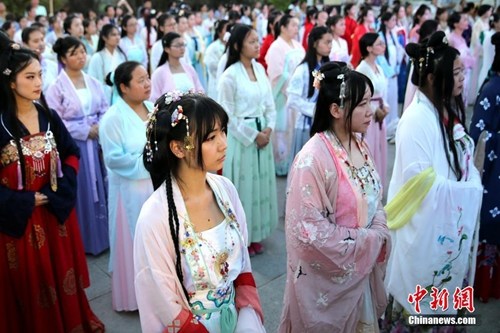Lantern Festival and Qixi Festival: Which is "China Valentine’s Day"?

BEIJING, Beijing, February 11th (Shangguan Yun) February 14th is the Western Valentine’s Day, which was welcomed by many young people after it was introduced to China. I don’t know when the traditional Chinese Valentine’s Day was called "Valentine’s Day in China", which once caused discussion. Gao Wei, secretary-general of Beijing Folklore Society, stressed in an interview with Zhongxin.com (WeChat WeChat official account cns2012) that there is no such thing as domestic folklore. If there must be a festival similar to Western Valentine’s Day, then the Lantern Festival is closer. "The Lantern Festival has a very lively lantern festival, and girls who don’t usually go out can justifiably go out to play and expand the opportunities to interact with the opposite sex."
As Tanabata is gradually called "Valentine’s Day in China", merchants from all walks of life have also taken the opportunity to launch promotional activities, which is very lively for a while. But is this really the case? According to Xinhuanet, Feng Jicai, honorary chairman of China Folk Writers Association, once said that Chinese Valentine’s Day is a festival with love as its theme and women as its protagonist. According to folklore, Chinese Valentine’s Day expresses the feelings of "never leaving" and "growing old together" between married men and women, and abides by their commitment to love, not expressing the feelings of pre-marital lovers or lovers. Therefore, it is not appropriate to call "Chinese Valentine’s Day" Valentine’s Day in China.

The reporter interviewed Wang Juan and Gao Wei, two experts who study folk customs, and both said that calling Tanabata "Valentine’s Day" is a misunderstanding of the connotation of this festival. Wang Juan said that on Tanabata, girls will take part in a series of activities, such as "floating needles for cleverness", and the key point is to pray for their ingenuity.
"Tanabata is a traditional begging festival, and at that time, the weather was getting cold, and people began to prepare winter clothes. In the old days, women were the protagonists of this festival." Gao Wei also said that the main custom of Tanabata is to worship clever girls and eat proper fruit, and girls will compete whose needlework is better. The Lantern Festival has a slightly "mass carnival" nature. Women in boudoir can also go out to watch the lanterns and meet the opposite sex. Comparatively speaking, the Lantern Festival is more like "China Valentine’s Day".

Indeed, the Lantern Festival, full of poetry and romance, is often associated with love. Many poems handed down from generation to generation express their love through Yuanxiao. Ouyang Xiu in the Northern Song Dynasty once wrote: "At the Lantern Festival this year, the moon and lights are still there; I didn’t see last year, and I cried Man Chun’s shirt sleeve. "
"Compared with other festivals and solar terms, the Lantern Festival has a little more folk customs, which is due to its emphasis on ‘ Noisy ’ Related to the characteristics of. However, it is precisely because of this feature that the custom of women going out to watch lanterns and dating men and women has been diluted, and the legend of Cowherd and Weaver Girl on Tanabata is widely circulated, which makes it easy to be considered as ‘ Valentine’s Day in China ’ 。” Gao Wei also said that there is no need to be too harsh on this title.
Gao Wei also said that in recent years, due to social concerns and other reasons, traditional festivals and customs such as the Lantern Festival have been paid more and more attention, and there are more and more related activities. However, the inheritance and development of these beneficial folk customs still need the active guidance of the government and the real participation of ordinary people in order to effectively inherit the excellent traditional Chinese culture. (End)